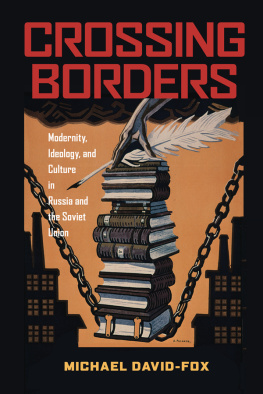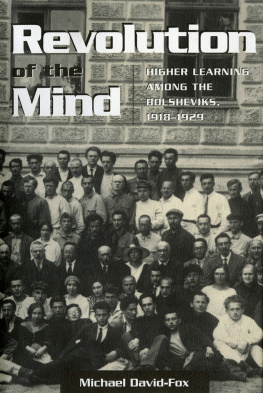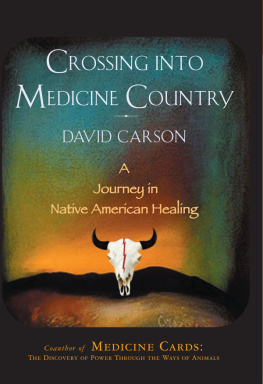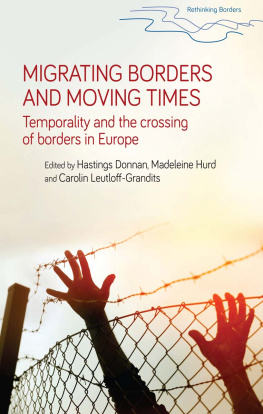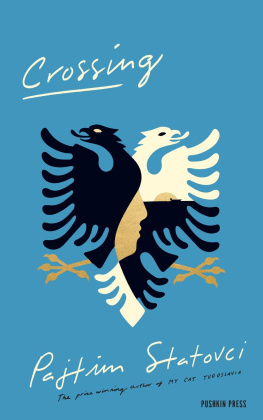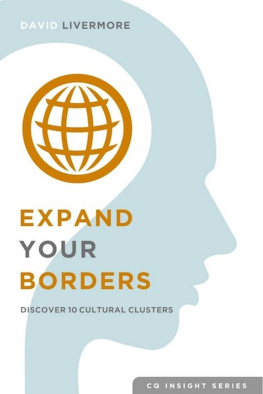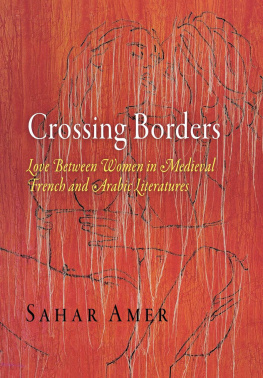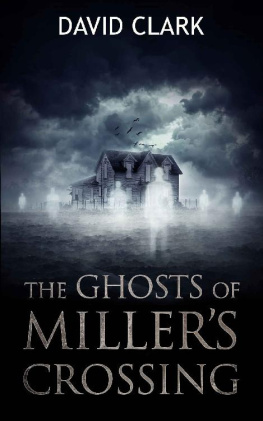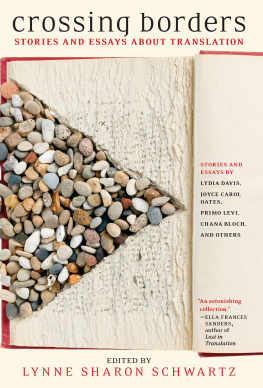Michael David-Fox - Crossing Borders
Here you can read online Michael David-Fox - Crossing Borders full text of the book (entire story) in english for free. Download pdf and epub, get meaning, cover and reviews about this ebook. publisher: University of Pittsburgh Press, genre: Politics. Description of the work, (preface) as well as reviews are available. Best literature library LitArk.com created for fans of good reading and offers a wide selection of genres:
Romance novel
Science fiction
Adventure
Detective
Science
History
Home and family
Prose
Art
Politics
Computer
Non-fiction
Religion
Business
Children
Humor
Choose a favorite category and find really read worthwhile books. Enjoy immersion in the world of imagination, feel the emotions of the characters or learn something new for yourself, make an fascinating discovery.
- Book:Crossing Borders
- Author:
- Publisher:University of Pittsburgh Press
- Genre:
- Rating:5 / 5
- Favourites:Add to favourites
- Your mark:
- 100
- 1
- 2
- 3
- 4
- 5
Crossing Borders: summary, description and annotation
We offer to read an annotation, description, summary or preface (depends on what the author of the book "Crossing Borders" wrote himself). If you haven't found the necessary information about the book — write in the comments, we will try to find it.
Crossing Borders — read online for free the complete book (whole text) full work
Below is the text of the book, divided by pages. System saving the place of the last page read, allows you to conveniently read the book "Crossing Borders" online for free, without having to search again every time where you left off. Put a bookmark, and you can go to the page where you finished reading at any time.
Font size:
Interval:
Bookmark:
Since I have been working on many of these essays for a long time, it is simply impossible to list all the many debts I have accumulated along the way. But I do want to start with one experience from long ago that proved influential. For a semester in 1996 I was a fellow at the Swedish Collegium for Advanced Study (SCAS) when the late Israeli sociologist Shmuel Eisenstadt was in residence. Eisenstadt, who passed away in 2010, was then collaborating with Bjrn Wittrock and others on what became their work on multiple modernities. Readers of this book will see how influential this experience later proved for my thinking about Russian and Soviet modernity. In Uppsala I also launched a long association with Gyrgy Pteri, whose discussions with me about state socialism and many comparative projects I have greatly valued over the years. But the idea and initial work for this book originated much later, in 2010, when I was a fellow at the Davis Center for Historical Studies at Princeton. There I benefited especially from the presence of Michael Gordin, Stephen Kotkin, and Daniel Rodgers.
For valuable comments and suggestions on individual chapters I am grateful to many colleagues, including Martin Beisswenger, Steve Grant, Masha Kirasirova, Stefanie Middendorf, Jan Plamper, and Erik van Ree. Peter Holquist, a pioneer for many of the topics discussed in this book, generously shared his insights on chapters me, to James Meador for acting as a thoughtful respondent in Ann Arbor, and to all those who took part in the discussions.
Since 2011, when I have been actively working on this book, I have found a collegial and intellectually inspiring home in the Department of History and School of Foreign Service at Georgetown University. I presented in April 2014 at the Faculty Seminar of Georgetowns Department of History. I am grateful for the comments of my colleagues, in particular David Goldfrank, Aviel Roshwald, Jordan Sand, and James Shedel. A number of my ideas have been born or refined in my graduate colloquium at Georgetown, Major Approaches to Russian and Soviet History, and I want to shout out an acknowledgment to each of my current PhD students working on Russian and Soviet politics and culture: Simon Belokowsky, Carol Dockham, Abby Holekamp, Isabelle Kaplan, Anita Kondoyanidi, Thom Loyd, Erina Megowan, Jonathan Sicotte, and Vladimir Ryzhkovskii.
I am also in the debt of my closest Russian colleagues at the Higher School of Economics (HSE) in Moscow, all of them paragons of the internationally oriented, deeply researched, and collaborative scholarship that has given so much to the field and to me personally: Oleg Budnitskii, Oleg Khlevniuk, and Liudmila Novikova. This book was completed when I was a scholarly adviser at the International Center for the History and Sociology of World War II and Its Consequences of the National Research UniversityHigher School of Economics.
has been significantly revised from Multiple Modernities vs. Neo-Traditionalism: On Recent Debates in Russian and Soviet History, Jahrbcher fr Geschichte Osteuropas 55, no. 4 (2006): 53555.
is previously unpublished but incorporates one revised section from On the Primacy of Ideology: Soviet Revisionists and Holocaust Deniers (In Response to Martin Malia), Kritika: Explorations in Russian and Eurasian History 5, no. 1 (2004): 81106.
has been significantly revised from What Is Cultural Revolution? Russian Review 58, no. 2 (1999): 181201.
is slightly revised from Symbiosis to Synthesis: The Communist Academy and the Bolshevization of the Russian Academy of Sciences, 19181929, Jahrbcher fr Geschichte Osteuropas 46, no. 2 (1998): 21943.
is previously unpublished but includes some revised passages from The Heroic Life of a Friend of Stalinism: Romain Rolland and Soviet Culture, Slavonica 11, no. 1 (2005): 329.
On Ongoing Debates in Russian and Soviet History
The specter of modernity continues to haunt much Western scholarship on Russian and Soviet history. In grappling with the issue, post-Soviet historiography has continued to invent new twists and variations on the thorny problems of old. In the past, the polarizations in the field may have been described somewhat differently: between industrial society and backwardness, between universalism and particularism, between Russia as European and Russia as unique. While this chapter analyzes a specific dispute over modernity and the concept of neo-traditionalism that first animated the field in the 2000s, it also looks backward to these broader antecedents that its participants did not discuss and forward to the debates continuing reverberations in the field.
In an edited volume on the new developments in the study of Stalinism, Sheila Fitzpatrick placed disagreements between a modernity group and its critics at the center of the new historiography. In the work of the current generation, Fitzpatrick wrote, two distinct approaches can be discerned.... The modernity group... suggests that the stereotype of modernity based exclusively on Western experience (parliamentary democracy, market economy) is inadequate and points to the Soviet example as an important alternative form. She described this groups case for an alternative Soviet modernity as resting on the presence of statist phenomena such as planning, early social welfare measures, scientism, surveillance, and the disciplines of self and collective. The critics, adherents of the concept of neo-traditionalism, did not necessarily deny that the Soviet Union in its way was modern, but their interest, however, is drawn more particularly to the archaizing phenomena that were also a part of Stalinism: petitioning, patron-client networks, the ubiquity of other kinds of personalistic ties like blat, ascribed status categories, court politics in the Kremlin, the mystification of power and its projection through display, and so on.
The emergence of two polarized positions, each grouped around its own concept, would be easily recognized by a historian of science or sociologist of knowledge as a common phenomenon in the evolution of scholarship. But these mundane features of the dispute should not obscure that it built on a foundational axis of modern Russian studiesone that the late Leopold Haimson, drawing on the Annales school, used to scrawl his famous iron cross on the blackboard on the first day of class, introducing generations of graduate students to the vertical line between universalism and particularism that divided the field of political and social conceptions. Because the post-Soviet skirmish engaged this core issue, it has retained significance even after many of its participants have moved on to new phases of debate. The issue of how to approach the problem of Soviet modernity continues to engage fundamental conceptual issues at stake in understanding Russias historical trajectory, the Soviet order, and Stalinism.
If this chapter has an underlying message, it is a plea to those who continue to find the modernity and neo-traditionalist paradigms convincing to interrogate their central concepts with depth and rigor. The aims of this discussion are (1) to analyze the post-Soviet conceptual split in the historiography, focusing mainly on works that explicitly advance notions of modernity and neo-traditionalism; (2) to locate differences between the tendencies and their implications, especially in their different understandings of the modern and their differing comparative lens; and (3) to suggest how the concept of multiple modernities, which was not explicitly embraced by the first post-Soviet proponents of Russian/Soviet modernity, at once resolves and complicates dilemmas already implicitly raised by the modernity paradigm. Along the way, I point out the continuing reverberations of the split in the 2010s, as numerous scholars take Soviet modernity as a given while others privilege traditional features of the Soviet order.
Font size:
Interval:
Bookmark:
Similar books «Crossing Borders»
Look at similar books to Crossing Borders. We have selected literature similar in name and meaning in the hope of providing readers with more options to find new, interesting, not yet read works.
Discussion, reviews of the book Crossing Borders and just readers' own opinions. Leave your comments, write what you think about the work, its meaning or the main characters. Specify what exactly you liked and what you didn't like, and why you think so.

